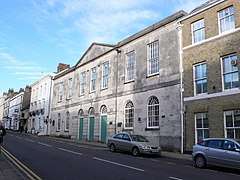Shire Hall, Dorchester
| Shire Hall | |
|---|---|
 | |
| General information | |
| Town or city | Dorchester |
| Country |
|
| Coordinates | 50°42′55″N 2°26′21″W / 50.71537°N 2.439067°W |
| Construction started | 1796 |
| Completed | 1797 |
| Design and construction | |
| Architect | Thomas Hardwick |
Shire Hall is an 18th-century courthouse in Dorchester, Dorset, designed by British architect Thomas Hardwick and built in 1796-97. The building was the centre of law, order and government, and served as the county hall for Dorset until 1955. It has been Grade-I listed since 1950.[1] In 2018, the hall opened as the Shire Hall Historic Courthouse Museum.
History
Shire Hall was constructed in 1796-97, replacing the original hall that had fallen into disrepair by 1769. Until the new building was completed, the court was based at the Antelope Hotel.[2] Shire Hall continued to operate in its original capacity until 1955, when the new county hall and crown court was opened.[3][2]
One of the most famous trials held at the hall was that of the Tolpuddle Martyrs in 1834. The six Dorset agricultural labourers were arrested for swearing a secret oath as members of the Friendly Society of Agricultural Labourers, which they had formed to bargain for better wages. The rules of the society show it was clearly structured as a friendly society and operated as a trade-specific benefit society. On 18 March 1834, the Tolpuddle Martyrs were sentenced to penal transportation to Australia. The sentence sparked public outrage, resulting in a petition of 800,000 signatures demanding their release and a 100,000-strong demonstration in London. All were pardoned, on condition of good conduct, in March 1836, with the support of Lord John Russell, who had recently become home secretary.[4][5] There is a plaque on the front of Shire Hall that commemorates the centenary of the commemorating the trial.
English novelist and poet Thomas Hardy also served as a magistrate at Shire Hall. He had been made Justice of the Peace for the Borough of Dorchester from 1884, sitting in court on almost forty occasions from then to 1919.[6] Hardy's experience as a magistrate provided inspiration for his writing.[2]
In June 2014, planning permission was granted to transform the Shire Hall into a new museum and visitor attraction.[7] The project received £1.5m of funding from the Heritage Lottery Fund in 2015, with West Dorset District Council pledging a further £1.1m.[8] Work commenced in 2016, while Christchurch-based company Pride Painting and Decorating Ltd began restoration work in March 2017.[9][10] The Shire Hall Historic Courthouse Museum opened to visitors on 1 May 2018.[11]
References
- ↑ "THE SHIRE HALL, Dorchester - 1119069". Historic England. 1950-05-08. Retrieved 2017-06-02.
- 1 2 3 "The history of Shire Hall". dorsetforyou.com. 2016-01-28. Retrieved 2017-06-02.
- ↑ Trevor Bevins. "Crown court closes". Viewnews.co.uk. Retrieved 2017-06-02.
- ↑ Somerset, Merryn (2015-03-18). "18 March 1834: Tolpuddle Martyrs sentenced to transportation". Moneyweek.com. Retrieved 2017-06-02.
- ↑ Goldfarb, Michael (2010-11-27). "Political Marching: What's at risk? - BBC News". Bbc.co.uk. Retrieved 2017-06-02.
- ↑ http://digitalcommons.colby.edu/cgi/viewcontent.cgi?article=2302&context=cq
- ↑ "Planning Application Details". Webapps.westdorset-weymouth.gov.uk. Retrieved 2017-06-02.
- ↑ "About the Shire Hall Project". dorsetforyou.com. 2016-01-28. Retrieved 2017-06-02.
- ↑ Trevor Bevins. "Hidden treasures uncovered as old court museum project takes shape". Viewnews.co.uk. Retrieved 2017-06-02.
- ↑ "Councillors of West Dorset District Council's strategy committee approved funding for the Shire Hall project (From Dorset Echo)". Dorsetecho.co.uk. Retrieved 2017-06-02.
- ↑ Post reply. "Narrow historic door at Dorchester's old crown court to be altered to allow disabled access". Dorset Echo. Retrieved 2018-02-21.